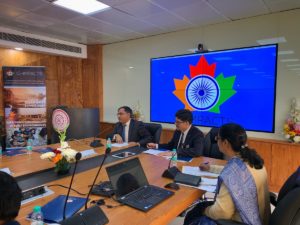Wednesday, December 12, 2018 – New Delhi, India. Four winning proposals on “Improving Occupant Survivability in Buildings During Fires” received awards today at the India-Canada Science & Technology Innovation Conclave in New Delhi, India. The event was jointly organized by IC-IMPACTS (A Canadian Network of Centres of Excellence), as well as the Department of Science and Technology (DST) and the Department of Biotechnology (DBT) under the Ministry of Science, India.
Fire statistics show that India has the highest incidence of fire-related deaths of any country in the world. In 2014 alone, there were more than 300,000 fires in India that resulted in about 25,000 deaths and fire losses in the order of thousands of crores (rupees). In Canada, First Nations communities are ten times more susceptible to die in house fires than the population at large.
The joint IC-IMPACTS and DST Call for Proposals under which the awards were made was launched in mid-2018 to address growing fire problems in India and Canada. Below are the winning researchers along with a summary of their proposals:


“Scientific collaboration between Canada and India is a key to solving problems and implementing real solutions in both nations, which face similar infrastructure, health, and water-related challenges,” said Dr. Nemy Banthia, CEO & Scientific Director of IC-IMPACTS. “We are delighted to partner with India’s Department of Science and Technology and to support these promising bilateral research projects that offer a tremendous opportunity for researchers from both nations to develop infrastructure solutions to mitigate fire hazards with the goal of minimizing loss of life and injuries and making buildings more resilient to fire.”
Prior to this award, DST and IC-IMPACTS launched two Calls for Proposals and awarded two rounds of funding for 10 bilateral research projects. These current awards are part of a third round of joint funding.
Prof. Ashutosh Sharma, Secretary, DST, expressed his delight that IC-IMPACTS and DST have developed several research partnerships between Canada and India. “I am optimistic about our joint research and look forward to more successful collaborative initiatives that will improve the lives of millions of people in Canada and India through science, technology, and innovation.”
IC-IMPACTS The India-Canada Centre for Innovative Multidisciplinary Partnerships to Accelerate Community Transformation and Sustainability (IC-IMPACTS) was established in 2012, winning a federal grant through the Network of Centres of Excellence (NCE). IC-IMPACTS builds research and community-based innovations to tackle pressing problems in Canada and India in the areas of infrastructure, water, and public health.
The non-profit is the only NCE with an international India focus. It has produced 808 research publications, 27 patents and invention disclosures, 792 trained professionals and 17 technology deployments in its first five years of existence. Its 278 multi-sector partners include 78 academic, 99 industry, 42 government, and 24 community partners, almost equally spread over Canada and India.
Through matching funds from Canada and India, joint research, and advanced demonstration of innovations, IC-IMPACTS has laid the groundwork for solving real-world problems in both nations, opening up gateways for multi-billion dollar markets in infrastructure, water, and public health.
Department of Science & Technology The Department of Science & Technology (DST), Government of India, was established in May 1971, with the objective of promoting new areas of science and technology and to play the role of a nodal department for organizing, coordinating and promoting science and technology activities in the country. DST has an important role in building a strong base for research, development, and demonstration in India and in addressing national concerns about strengthening science and technology.
2024 IC-IMPACTS Conference in Delhi December 9 - 11, 2024 New Delhi, India